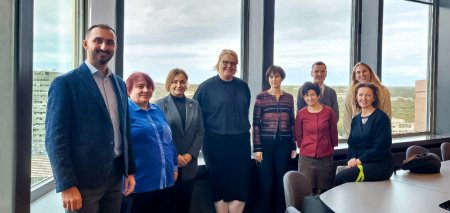Contact center of the Ukrainian Judiciary 044 207-35-46

A delegation of Ukrainian judges, including Nataliia Antoniuk, Vice President of the Criminal Cassation Court of the Supreme Court, made a study visit to The Hague (Netherlands).
Participants in the visit discussed the application of international humanitarian law in the context of the criminal law assessment of artillery targeting in the context of international crimes. Judges, prosecutors, investigators, lawyers, legal experts, military personnel, diplomats and academics focused on the application of international humanitarian law and the difficulties and challenges associated with artillery shelling. Separately, participants at the event discussed issues related to evidence in criminal proceedings concerning artillery shelling in Ukraine.
The conference provided a platform to discuss the legality of artillery shelling and the targeting of civilian populated areas and civilian infrastructure from the perspective of international law; the role of the principles of international humanitarian law and the jurisprudence of the International Criminal Tribunal for the former Yugoslavia in understanding artillery shelling as an international crime.
.jpg)
The event also covered the process of collecting and presenting evidence of artillery attacks; practical aspects of investigations and court proceedings, including the difficulties inherent in handling evidence and overcoming the unique challenges posed by the proximity of legitimate military objectives to civilian areas and civilian infrastructure.
In addition, the Ukrainian delegation met with judges of the District Court of the Netherlands in The Hague, which hears cases of international crimes under universal jurisdiction, and learned how this court ensures openness of proceedings and respect for the rights of victims and witnesses, as well as international experience in considering cases of attacks against prohibited targets as war crimes.
Ukrainian judges also met with representatives of the Asser Institute and UpRights experts who developed the Benchbook on the Adjudication of International Crimes.
The visit was supported by the USAID Justice for All Program.